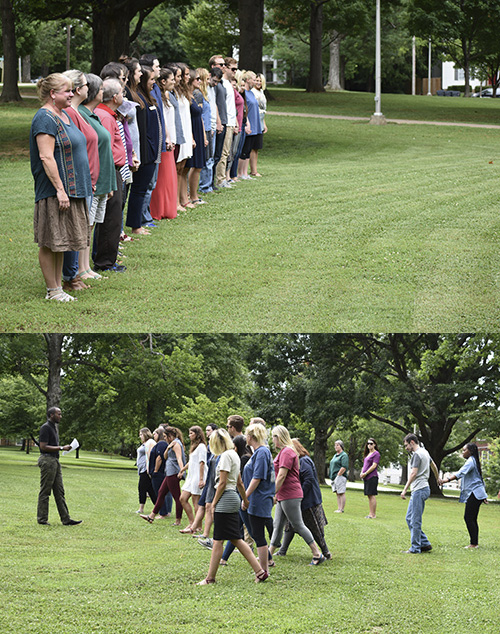Counselor Education Students Learn About Diversity Through Privilege Walk

In the top photo, Kristin Higgins, far left, and her counselor education students begin the privilege walk on equal footing. As Terrance Boyd, far left in the bottom photo, reads statements, the teacher and students begin to separate according to their response to the statements.
Kristin Higgins figured she would be in the front when she participated in a privilege walk she organized for her class on diversity.
Higgins teaches in the counselor education program at the U of A. She's older than the majority of her graduate students, she comes from a middle-class family, she has a good job with a measure of financial security and she's white. All of those factors meant she took more steps forward than backward in the privilege walk. It's an exercise that Higgins asked Terrance Boyd, director of recruitment and retention at the Honors College, to direct for her class.
The privilege walk is an activity that highlights how people benefit or are marginalized by systems in society. Higgins said she wanted her students to participate to help them understand how differences in backgrounds and experiences shape individuals and how those differences must be taken into account during the counseling process.
"It was a little embarrassing to be in the front," Higgins said. "I found myself making jokes about it."
An individual's age could also affect placement since times and societal norms about such issues as sexual harassment and equality have changed and laws such as Title IX, a federal civil rights law that prevents sex discrimination in education, were passed. And, in the past, some people didn't need as much education to get a well-paying job as may be required now.
The graduate students and Higgins lined up holding hands on the Old Main lawn south of the Graduate Education Building. Boyd read to them statements about such aspects of their lives as primary language, education level, socioeconomic status, feelings of safety and comfort with authority figures, disabilities and mental illness, personal identity and experiences with bullying and discrimination. Questions that got to socioeconomic status and education, for example, covered details such as being hungry because of a lack of money to buy food, owning a computer, owning books and having health insurance. Several other questions got to the heart of racial and ethnic differences and how they affect people's lives.
Boyd, who conducts the privilege walk for groups in the Honors College, helped lead the discussion afterward.
Some students became emotional when talking about the exercise. It brought back memories of struggles they faced as children or made them sad to have to let go of the hand of someone in the class with them as one moved forward or backward but the other didn't.
"While the past is important, it doesn't always dictate where you can go," one student said. "I thought about the separate phases of my life. In the past, I was in a safer environment and supported by my parents."
Others felt guilty about their perceived privilege.
"I recognize the feeling, but don't know what to do about it," another student said.
One student said being in the underprivileged group can be draining because, in an odd sort of role reversal, you find yourself trying to make the privileged people feel better about themselves. The class talked about approaching people, not from what they called a deficit model, but by looking at what people can do.
"With privilege comes an ability to have power, to have a voice that you can be aware of and use in a positive way, not to speak for someone but to speak out against injustice," Higgins said.
Topics
Contacts
Heidi S. Wells, director of communications
College of Education and Health Professions
479-575-3138,
heidisw@uark.edu
Headlines
Fay Jones School Faculty Projects Recognized With 2024 Architectural Education Awards
Professors John Folan, Candice Adams and Emily Baker were each a part of teams that received 2024 Collaborative Practice Awards from the Association of Collegiate Schools of Architectuure.
2024 UARK Jazz Festival Hosts Series of Performances April 16-19
Hosted by the Department of Music, the festival will feature some of the region’s finest jazz and classical musicians and feature special guest artist Angel “Papo” Vázquez.
Engineering Students Spend 'Alternative Spring Break' Touring Missouri Companies
Nearly two dozen College of Engineering students visited a group of Missouri employers as part of Alternative Spring Break, a three-day tour helping employers with recruitment and students with future careers.
Outstanding Alums, Students Recognized by Crop, Soil and Environmental Sciences
Mike Phillips, Edgar Mersiovsky, Robert Rorie and Jody Davis were honored at the annual Department of Crop, Soil and Environmental Sciences Spring Awards Banquet, along with several students.
Heather Sprandel Recognized as March 2024 Cordes Chair by TFSC
Heather Sprandel, instructor of management in the Sam M. Walton College of Business, was honored by the Wally Cordes Teaching and Faculty Support Center as the March 2024 Wally Cordes Chair.




